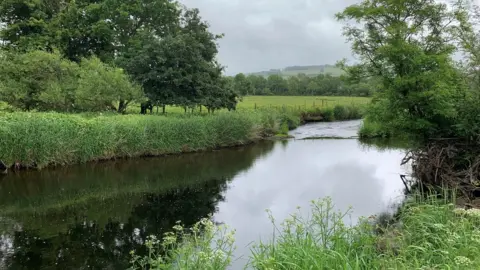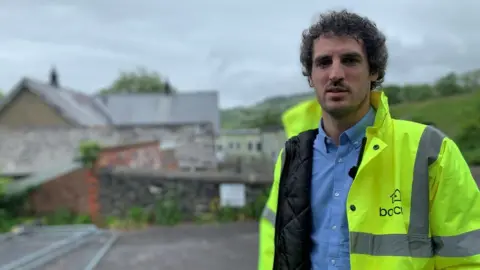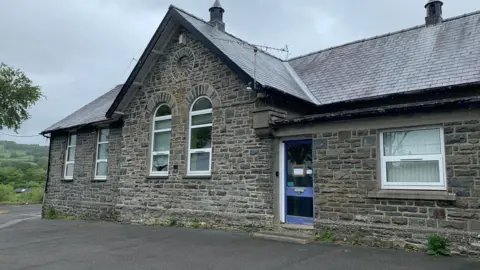Water pollution: Affordable housing hit by phosphate targets
 BBC
BBCA lack of affordable housing will only worsen while phosphate pollution targets put plans to build new homes on hold, a housing association has said.
Tougher targets were brought in for nine Welsh rivers in January 2021, with 12 areas halting planning decisions until the new standards can be met.
Natural Resources Wales and Welsh Water said there were no quick fixes or "silver bullets" to resolve the crisis.
The Welsh government said it was hosting a summit to discuss the issue.
It added it aimed to deliver 20,000 low-carbon homes by the end of the Senedd term, while the health of rivers was also of "paramount importance".
Proposals for residential development within Special Conservation Areas (SAC) must show they will not increase phosphate levels.
Phosphates are naturally occurring minerals found in human and animal waste.
They are vital for plant growth but at high concentrations in water bodies, phosphates can cause dramatic growth of algae, which leads to depleted oxygen levels, damaging aquatic plant and animal life.
The new phosphate targets are estimated to be 50 to 80% stricter than previous levels, and while Welsh Water said it was technically feasible to upgrade treatment works to strip phosphates, in reality it would be impossible due to the huge investment needed.
In March, plans to build 20 affordable houses at the old Coedmor primary school in Cwmann, Carmarthenshire, in the River Teifi SAC, were put on hold by phosphate targets.

Geraint Roberts, a senior development officer for the housing association Barcud which submitted the plans, said: "You can't build a dwelling that connects to the main sewers system, so it's putting a stop to hundreds of homes."
"We've got data that shows there is a massive need for affordable housing in these rural areas and the Welsh government is providing grant money that allows us to build these houses, but we can't take advantage of it because we can't get planning permission to build."
He said the simple answer would be to add phosphate stripping into the sewerage system.
"Until there's a solution we can't build any houses in these areas. The lack of affordable housing will just get worse," Mr Roberts added.
Ioan Williams, lead specialist advisor on SAC rivers to Natural Resources Wales (NRW), said the targets were "in place for a very good reason" and there was "no silver bullet or simple answer to this".
He said: "Phosphates will come from run-off from agriculture. It'll come from our waste water treatment works, from our septic tanks. There's phosphate in everything from toothpaste to dishwasher tablets."
He welcomed Welsh government plans to host a summit at the Royal Welsh Show, and warned the planning paralysis was likely to continue unless solutions were found.

BBC Wales has seen a letter sent by Welsh Water last year to planners which showed only 46 waste water treatment plants have phosphate stripping capabilities out of a total of 829.
A further 12 will be added by 2025.
Steve Wilson, managing director for waste water services at Welsh Water, said there was "surprise" when the new targets were announced.
He said: "We tend to work in five-year investment cycles with our environmental regulators, so we're always looking ahead to decided what investment we need to do for the future."
Mr Wilson said even if phosphate stripping was added to many sewage treatment works "they won't pass those new standards" and it would not solve the issue.
Mr Wilson said initial research by Welsh Water from the Usk and Wye catchments showed about 25 to 30% of phosphates came from waste water treatment works, with the rest coming from sources such as agriculture and private septic tanks.
What has the Welsh government said?
Welsh Water is currently developing wetlands in Herefordshire to try to mitigate the impact of phosphates.
The wetland is planted with a mixture of plants which have been selected to maximise the uptake of phosphates.
The Welsh government said: "The case for social housing is as strong as ever, which is why it is a priority for this government and why we have set out the challenging commitment to deliver 20,000 new low-carbon homes for rent within the social sector during this government term.
"The health of our rivers is also of paramount importance to this government.
"It is for this very reason that we are holding the SAC Rivers Summit which will provide a focused opportunity for all parties to consider how they can play their part and contribute to solutions."
